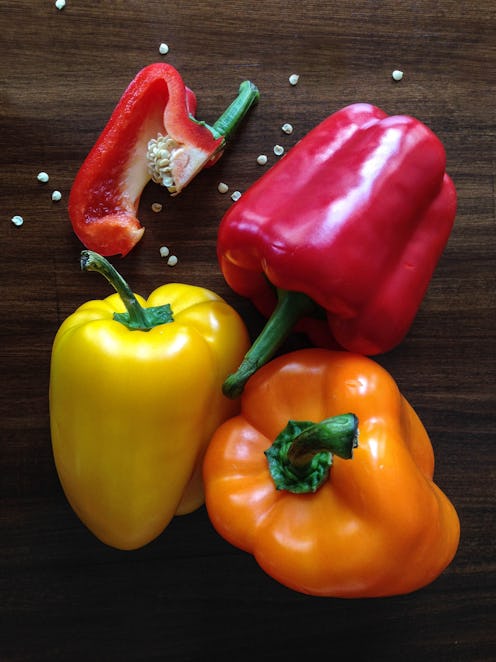Life
These Common Foods Might Be Making You Sick

We've all been told to wear a jacket in the cold, wash our hands before eating, and load up on our fruits and veggies to stay in tip top health, but what if the food we eat everyday makes us sick? Although healthy habits and practices can help ward off germs and strengthen our immune system, sometimes it is the food we are eating that's actually making us feel under the weather. Even if we avoid the usual culprits such as processed foods and sugar, certain foods are prepared in a way that make them susceptible to certain viruses or bacteria.
According to the Centers for Disease Control and Prevention (CDC), food contamination can occur in a variety of ways, from bacteria present in raw or undercooked produce, products that have been left out for too long, or even food that was raised or prepared in an unsafe or contaminated environment. Though sometimes it can be impossible to know if your food is going to make you sick, it's good to have an idea of what foods may lead you to run desperately towards the toilet or that could cause severe health issues later on.
While it's also unlikely that you'll never get sick, and most food borne illnesses are relatively common (the CDC estimates that 1 in 6 Americans will get sick each year with a foodborne illness), it's still smart to keep an eye out for what may affect you negatively. To keep yourself aware of what foods that can commonly make you sick, I've talked to a few health experts.
1. Leafy Greens
"Greens can be contaminated before you buy them by manure, dirty water, and unclean hands," Leah Kaufman, MS, RD, CDN tells Bustle over email. A study by the CDC found that nearly half of all food illness are caused by leafy vegetables.
"Always be sure to wash your lettuce, spinach, kale, or other greens before you eat them," suggests Kaufman.
According to Home Food Safety, washing leafy greens will "help reduce the presence of microorganisms" present on the foods. It's important to note, however, that reduce does not mean the same thing as eliminate completely.
2. Oysters
Raw oysters can be a delicious appetizer, but they often contain Vibrio vulnificus, a bacteria commonly found in waters where oysters are cultivated, according to the Food and Drug Administration.
"Oysters lie on the ocean floor and filter water," says Kaufman. "As a result, if the oysters are served raw or undercooked you may find that you have an upset stomach."
3. Eggs
Uncooked or undercooked eggs can contain salmonella, a bacteria that causes one million sicknesses a year in the United States, according to the CDC.
"Salmonella causes diarrhea, fever, and abdominal cramping 12 to 72 hours after infection," says Kaufman. Keeping eggs refrigerated and thoroughly cooking them will prevent your chances of contracting illness from the bacteria if its present.
4. Hard-Skinned Fruits And Vegetables
Washing fruits and vegetables before eating them is crucial to avoid bacteria that may be present and will greatly reduce your chance of foodborne illness.
"Bacteria can hide on the exterior, and as we cut into the fruit or vegetables, the bacteria may infect the fruit," says Kaufman. "This bacteria is typically Listeria which causes nausea, vomiting, fever, and diarrhea."
5. Farmed Fish
Farmed fish found grocery stores can contain high levels of contamination, especially polychlorinated biphenyls (PCBs), according to the Environmental Watch Group. High levels of PCBs can wreak havoc on your immune system and also increase your risk of cancer.
"In my opinion, eating tilapia is worse than eating bacon," says health and fitness expert Dr. Josh Axe over email. "Even salmon, touted for being the health fish of choice is virtually poison to consume if farmed."
Well some experts, like Axe, wouldn't suggest eating any farmed fish, sources like Well, the New York Times health blog, state that fish farming practices are improving, and that eating farmed fish in moderation with fresh fish is OK.
6. Artificial Sweeteners
You may think that sugar-free is the way to go, but artificial sweeteners have their own negative health effects.
"New research has shown that artificial sweeteners causes a disturbance in gut flora and can actually cause diabetes," says Dr. Axe.
Sugar substitutes have also been clinically linked to allergies, cancer, headaches, and even seizures, according to The Journal of Pharmacology and Pharmacotherapeutics.
But are artificial sweeteners OK in moderation? According to The Chicago Tribune, the answer is yes, but you should know what's best for you in particular in any case. For example, "people who have the rare disease phenylketonuria (PKU) should not eat or drink anything with aspartame."
7. Corn
Ninety percent of corn grown in the United States is genetically modified, and while we don't know everything about GMOs quite yet, studies published in the Journal of Agricultural and Food Chemistry have found that genetically modified corn can cause immune system changes in mice due to the presence of the toxin Bt, a pesticide. Since corn is found in many products such as meat, sauces, ketchup, and other processed foods, many people experience stomach inflammation as a result. However, as with any food, everyone reacts differently — so try taking note of how your body is reacting to the intake of corn and go from there.
It's possible that you've gotten along fine without washing your produce or monitoring how much artifiical sweetener you use until now, but if you're noticing a correlation between your intake of leafy greens and stomach problems, or you notice corn or farmed fish seem to make you feel weird, trying adjusting your eating or food prep habits and you may be surprised at the results.
Images: Pexels